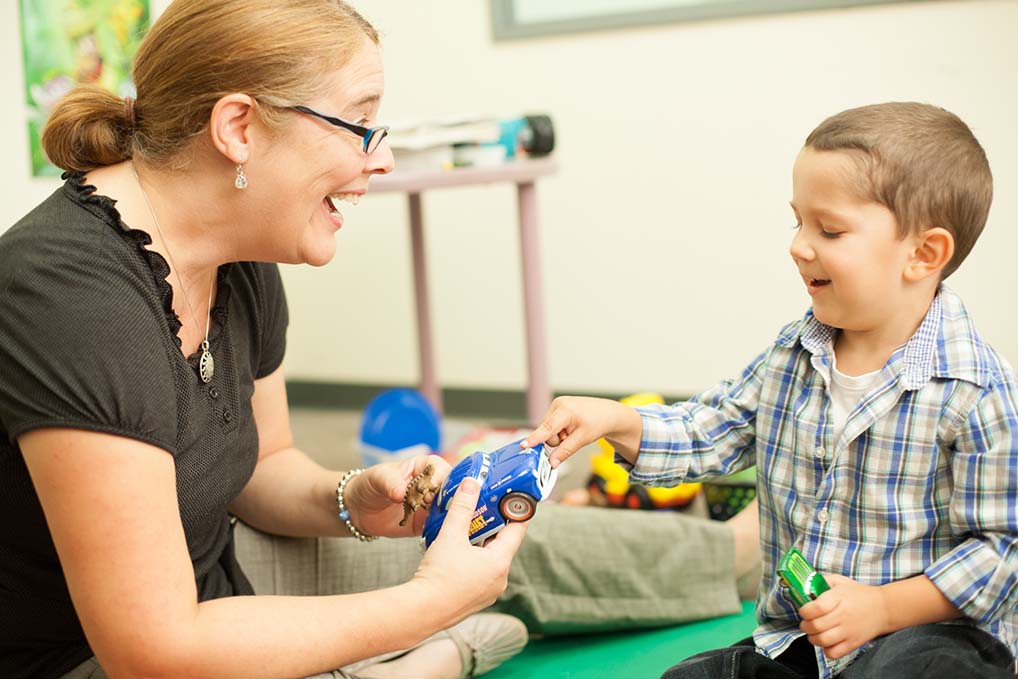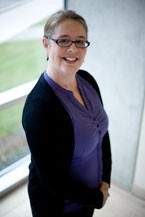Researcher in Focus: Spotlight on Dr. Jessica Brian
August 19, 2019 | News

 Dr. Brian has been a KBHN researcher since 2015. We reached out to ask her some questions about her work to support children with neurodevelopmental disabilities and their families.
Dr. Brian has been a KBHN researcher since 2015. We reached out to ask her some questions about her work to support children with neurodevelopmental disabilities and their families.
Can you describe your educational path and what inspired you to get into the work you do now?
I have wanted to be a psychologist since high school. I read about a young girl with autism who was severely impaired in many ways, but had exquisite artistic abilities. This really captured my imagination. I went on to do an undergrad degree in Psychology at Queen’s University; during the summers, I worked as a nanny for a little boy and I lived with his family. He had some difficulty learning language and was loving and funny and smart; he received a diagnosis of autism during the years I was working with him. From that point on, my path was determined, and I single-mindedly pursued graduate school in Psychology.
At the time, the family I was working with recommended a particular professor in the field, Susan Bryson, so I applied to the grad school she was teaching at, and one other program as a fall-back. I was fortunate enough to study with Dr. Bryson for the next nine years, doing a Master’s, PhD, and post-doc with her. This led me to SickKids, where I worked with Wendy Roberts, one of the clinical experts in autism at the time, together with an amazing cohort of Speech-Language Pathologists, Developmental Fellows, including Lonnie Zwaigenbaum, and other eminent researchers in the field, such as Peter Szatmari and Steve Scherer.
Dr. Roberts encouraged me to pursue my doctoral internship at the Princeton Child Development Institute in New Jersey, where I was immersed in the field of behaviour analysis in autism intervention. If you browse through my CV you will notice that I have continued to collaborate with all of these people who started out as my mentors and have, over time, become colleagues. Like a family tree, these relationships have branched out to include many of my current collaborators, and trainees, and as the network has grown, so has the research productivity and impact.
What projects are you currently working on?
I am currently working on many projects, but my focus is on early detection of autism (ASD) and very early intervention. I co-developed an intervention with Susan Bryson, and have built a program of research with her, and other experts across the country including Isabel Smith and Lonnie Zwaigenbaum. This work started as a small pilot project, and has evolved through an initial randomized control trial (RCT), a couple of community extension projects, and the development of a group-based model currently being piloted in a clinic context. I also have the privilege of co-leading the Autism Research Centre with Evdokia Anagnostou, who established the first clinical trials network across Ontario, and has brought me on board for her studies of psychopharmacological interventions in autism, which has been such a fascinating learning experience for me. Opportunities for novel approaches and perspectives to my work have come from multi-disciplinary collaborations including those with our two other ARC faculty members, Azadeh Kushki (engineering) and Melanie Penner (developmental paediatrics). Each collaboration yields new perspectives and ideas that move the field further than anyone could ever do alone.
To you, what’s the biggest issue we need to address when it comes to neurodevelopmental disability research?
There is a lot of important basic research taking place in the field, and progress has been steep over the past several years. My skill set and expertise lies in behavioural and clinical research and I am committed to developing interventions, and systems for delivering those interventions, that are accessible as early as possible, to those who need them.
I view all learning as a type of intervention, and my work aims to build intervention into existing systems of care (home life, child care, school) in ways that are natural and supportive and that allow children and families to flourish; given the high rates of autism, interventions need to be feasible and resource-efficient in order to be sustainable.
Some of the barriers to early intervention include limited resources for early detection and diagnosis, and I have been working with Melanie Penner and Evdokia Anagnostou to build community capacity in this area, so families don’t have to wait for diagnoses at a time when intervention could have a significant impact on a child’s development. Working within a public system presents opportunities and challenges for developing a program of research that has the potential to positively impact individuals and society over time.
What research accomplishment are you most proud of in your career so far?
I am most proud of my work in early detection and very early intervention. Supported by an amazingly committed cadre of research associates, assistants, coordinators, students, and trainees, together with immeasurable contributions from families, our team has made an impact on the field’s understanding of autism early in development. We have influenced many research groups, by developing an early detection measure, and this work is influencing clinical practice. Our early detection work directly guided the development of our early intervention program, allowing us to design a model that is based on the earliest manifestations of autism. To date, our intervention program has reached over 200 families across three provinces, and we hope to start seeing an exponential increase as we work toward developing increasingly portable models that can be implemented widely across the globe.
Dr. Brian is currently a Psychologist and Clinician-Investigator at Holland Bloorview Rehabilitaion Hospital, a key partner of KBHN.